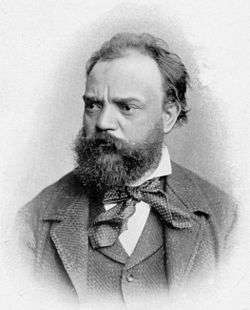King and Charcoal Burner
King and Charcoal Burner (Czech: Král a uhlíř), Op. 14, is a three-act (23-scene) comic opera by the Czech composer Antonín Dvořák.
| Antonín Dvořák |
|---|
 |
|
Operas
|
The first version of the opera was written in 1871 to a libretto by Bernard J. Lobeský. That same year the composer offered the finished opera to the Czech Provisional Theatre in Prague. Bedřich Smetana, who was in charge of the opera at that time, returned the work to Dvořák the following year, claiming it was unperformable.
Dvořák created entirely new music to the same libretto – without using any of the original material. This new version was finished in 1874 and the première took place on 24 November 1874. By that time, Smetana already was no longer the chief conductor. (He became deaf in 1874.) Despite a good reception from both critics and audience, the opera was withdrawn after only four performances. Dvořák made another substantial revision in 1887, the premiere of which was conducted on 15 June 1887 by Mořic Anger. The libretto was partially refashioned by Václav Juda Novotný and Dvořák made modifications particularly to the third act.
In 1914 a heavily reworked and cut edition of Dvořák's 1887 version was prepared by Karel Kovařovic, and this forms the basis of all currently available recordings.
Roles
| Role | Voice type | Premiere cast, 24 November 1874 (Conductor: Adolf Čech) |
|---|---|---|
| King Matyáš | baritone | Josef Lev |
| Jindřich, Burgrave of Křivoklát | tenor | Jan Šára |
| Matěj, coal-burner in the Křivoklát forests | bass | Karel Čech |
| Anna, his wife | contralto | Betty Hanušová (later Fibichová) |
| Liduška, his daughter | soprano | Marie Zofie Sittová |
| Jeník, young charcoal burner | tenor | Antonín Vávra |
| Eva | soprano | Ema Maislerová-Sáková |
| First knight | tenor | |
| Second knight | bass |
Synopsis
The theme of the opera is from old legend of the rescue of a Czech ruler (probably prince Jaromír of Bohemia of the Přemyslid dynasty, or his brother Oldřich of Bohemia) who gets lost in the woods of Křivoklát. One of the main characters – the charcoal burner Matěj – was taken by Lobeský from the puppet theatre play Feast Day in Hudlice (based on the same theme). Lobeský also replaced the Přemyslid king with the Habsburg Emperor Matthias (and thus shifted the action from the 11th to the 17th century). As Matěj is the familiar form of Matthias in Czech, Dvořák gained two characters with the same names – one poor, one rich. The king mingles incognito among the common folk (a frequently recurring theme in Czech culture of that time), so the plot is based on the merging of the worlds of the aristocracy and the common folk.
Recordings
- (All of the revised 1887 version, edited by Karel Kovařovic)
1948: (Radio, unreleased). (King Matyáš) Bořek Rujan, (Matěj) Karel Kalaš, (Anna) Ludmila Hanzalíková, (Jindřich) Oldřich Kovář, (Liduška) Štefa Petrová, (Jeník) Antonín Votava, (1st Knight) Bohuš Holubář, (2nd Knight) Jan Soumar. Prague Radio Symphony Orchestra and Chorus, c. František Dyk
1960: (Radio, Amazon.co.uk download only). (King Matyáš) Jindřich Jindrák, (Matěj) Eduard Haken, (Anna) Ivana Mixová, (Jindřich) Milan Karpíšek, (Liduška) Libuše Domanínská, (Jeník) Oldřich Spisar, (1st Knight) Jiří Joran, (2nd Knight) Rudolf Vonásek. Prague Radio Symphony Orchestra and Chorus, c. František Dyk
2005: (Orfeo C 678 062 H). (King Matyáš) Dalibor Jenis, (Matěj) Peter Mikuláš, (Liduška) Lívia Ághová, (Anna) Michelle Breedt, (Jeník) Michal Lehotsky, (Jindřich) Markus Schäfer. WDR Sinfonieorchester Köln, WDR Rundfunkchor Köln, Prague Chamber Choir, c. Gerd Albrecht.
1989: (Highlights – released 1996, Supraphon SU 3078-2 611). (King Matyáš) René Tuček, (Matěj) Dalibor Jedlička, (Anna) Drahomíra Drobková, (Jindřich) Viktor Kočí, (Liduška) Jitka Svobodová, (Jeník) Miroslav Kopp, (1st Knight) Štěpán Buršík, (2nd Knight) Jaroslav Prodělal. Prague National Theatre Orchestra and Chorus, c. Josef Chaloupka. (from 1989 television production)
1951: "Here am I, a lover waiting" (Anna's aria, Act 2). Marie Tauberová. CD release 2015 on Prague Radioservis 2-CD "Czech Romantic Opera" (CR0782-2).
References
- Burghauser, Jarmil: Antonín Dvořák. Prague: Koniasch Latin Press, 2006. ISBN 80-86791-26-2
- The New Grove Dictionary of Opera (Stanley Sadie ed.), 1992, p. 992. ISBN 0-935859-92-6
- Tyrrell, John, 1988, Czech Opera, Cambridge University Press, pp. 81–82. ISBN 0-521-23531-6